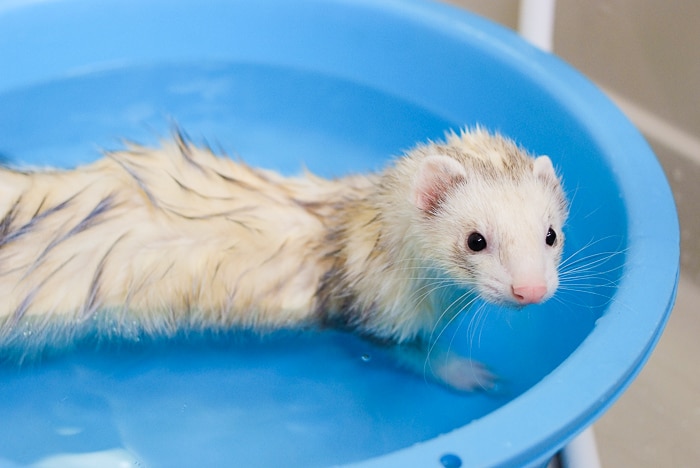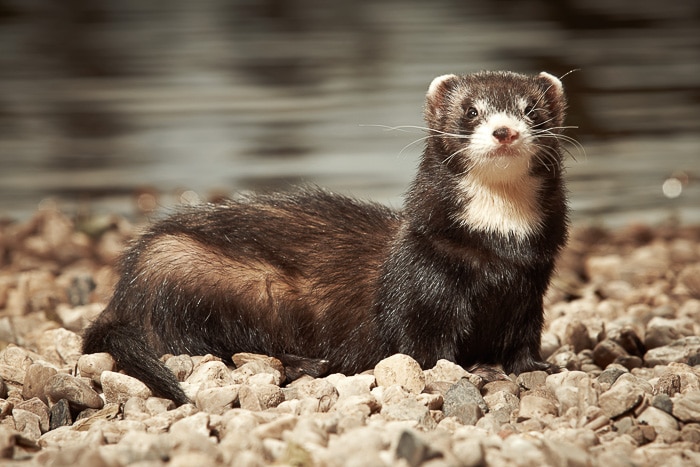If you are the type of pet parent that loves keeping small-sized furries like ferrets, then you need to be acquainted with the character traits of the little creature before making a buying decision. One particular feature of the ferret that has off-put many would-be pet parents is its strong body odor that comes from both the skin and the creature’s anal gland. Though the odor can be rather discouraging, there are several ways of combating it for those that insist on keeping the little furry as a family pet. Ferrets smell does have some remedies that can make keeping them bearable.
Table of Contents
Dissecting The Mystery Behind The Ferret’s Smell
Yes, the ferret does smell and the little creature has two types of smell –
1. The Musky Smell That Comes From The Oil Gland Or Sebaceous Gland
It is the skin of the ferret that exudes that signature musky smell that always surrounds it. When the sebaceous gland of the ferret is at work, the fur gets greasy and gives rise to the subtle musky, sweet smell. This is the type of smell to expect whenever you sniff at this furbaby, however, in the long run, the smell can become pungent as it rubs off on the animal’s beddings and the usual spots where it loves to play.
As the sebum (oil) builds up, you will begin to perceive a stronger version of the musky smell which is quite unpalatable. Besides, the ferret’s skin gland has a sex link, thus, the animal will smell even more when it goes into mating mode.
Reducing The Musky Smell On Your Ferret

To reduce the stink from your pet ferret, it is advisable for pet parents to always regularly clean both the animal’s beddings and cage. For the cage, always deep-clean, scrubbing out the carpets on a regular basis just to rid the environment of the excess oil. It is quite unfortunate to note that you cannot bathe your ferret as often as you would wish to as bathing doesn’t do much in reducing the smell.
Rather, it will worsen the situation as the animal’s sebaceous gland kicks in wherever there is a dearth of oil on its skin. In fact, the oil gland works overtime to produce even more oil to replace the one you have washed off, giving rise to even more smell.
Besides, bathing your ferret severally poses a great risk to them as it would lead to dry and flaky skin which may result in serious skin issues; the reason is that the oil produced by the oil gland works to protect the animal’s skin and coat.
Does Fixing Your Ferret Help In Odor Reduction?
We should also note that ferrets that are unfixed will smell more compared to the ones that are fixed. Unfixed ferrets tend to have increased hormones that lead to the production of more oil and the resultant odor is more pungent.
For the male ferret, their smell will become unbearable when they come into season. De-sexing or fixing a ferret can reduce the odor by 90 percent and experts recommend that this should be done between five to seven months of age.
2. The Pungent Smell That Is Unleashed From The Anal Glands
The real odor that is emitted from the ferret comes from its anal gland, though this smell comes occasionally and is not permanent like the musky smell. Being the skunk’s distant cousin, the ferret uses the scent from its anal gland defensively. Pet parents who keep this furbaby call this “a poof” and the occasions that can lead to the unleashing of this “poof” from the anal gland include over-excitement, excessive fear, sex, fighting mode, or scary mode.
The “poof” from the little creature’s anal gland is so unpleasant that if it is unleashed while the furry is in your hand, then, you will have to give your clothes a thorough wash before it can be removed, otherwise, the smell stays. The location of the ferret’s anal sack is the base of the furry pet’s tail and can be removed by a vet through a common procedure that is relatively simple; this is referred to as a de-scenting operation. However, this simple surgery won’t get rid of the odor a hundred percent; it would just reduce it to a large extent.
Prospective pet parents who have people that cannot cope with the little creature’s odor are advised to change their choice of household pet and go for an animal with lesser odor.
Some Countries Approve The Removal Of Anal Glands
In advanced countries like the United States of America, they have specialized commercial breeders who breed ferrets and supply them to pet stores across the country. These breeders employ the services of experienced vets who assist in removing the animal’s anal glands before shipping them to the pet stores.
However, there are countries where the removal of the anal gland is tagged as animal abuse and highly prohibited. Some people actually believe that removing the anal gland is rather unnecessary since the scent from that region comes very rarely.
Read Also: How Long Do Rabbits Live As Pets?
How To Deal With A Ferret’s Odor
- Your furry friend can be limited to a particular area of the house or you can restrict its movement to just one room. But, don’t forget that ferrets need exercise and should be allowed out of the cage daily to burn off pent-up energy.
- Fixing your ferret is a good way to deal with the pungent odor that comes once in a while. However, ensure that your little friend is of age before carrying out the process.
- After undergoing the simple surgical procedure, your fur buddy will still be emitting some smell, thus, you can bath it once a month with a mild shampoo. The bath should never come frequently as it washes away the natural skin oil, causing the sebaceous gland to produce more oil, meaning additional odor.
- The ears of the ferret also give out their own odor and should be cleaned regularly, however, you must handle the ears with care.
- The beddings of your furry friend must be kept scrupulously clean; the same applies to the animal’s litter box.
- Your fur buddy should be fed with a high-quality diet; it can be the type produced exclusively for ferrets or you can give it feline food.
- There are ferret odor neutralizers in the pet stores; purchase any harmless one and spray it directly on your furry companion. Your vet can come in handy with recommending harmless odor neutralizers.
